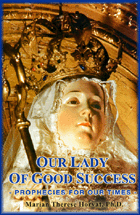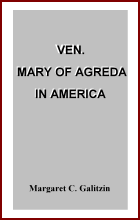American History
 |
 |
 |
 |
 |
 |
 |
Fundamental Errors of the Founding Fathers - 3
Was Jefferson Inspired by
St. Robert Bellarmine?
Before moving on to the next Founding Father, it is necessary to refute a common error of Catholics regarding the Declaration of Independence. Many allege that Thomas Jefferson was inspired by the teachings of St. Robert Bellarmine and, consequently, Thomas Aquinas, in his drafting of this highly praised document.
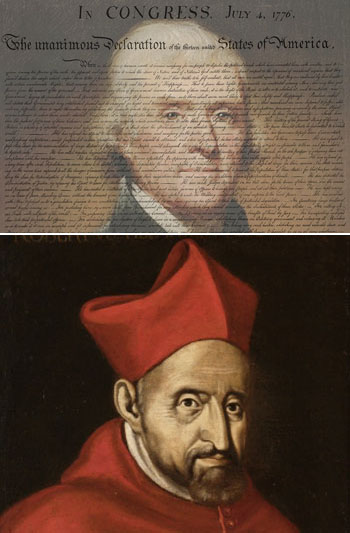 Thus, they come to the conclusion of Dr. Matthew Bunson, who writes in the National Catholic Register: “If, then, Jefferson was influenced by Bellarmine, the author of the Declaration was also shaped by Aquinas and the whole of the Catholic intellectual tradition. And so, too, was America’s chosen form of government.”
Thus, they come to the conclusion of Dr. Matthew Bunson, who writes in the National Catholic Register: “If, then, Jefferson was influenced by Bellarmine, the author of the Declaration was also shaped by Aquinas and the whole of the Catholic intellectual tradition. And so, too, was America’s chosen form of government.”
According to these Catholics, the United States of America is the most Catholic form of government that has ever existed in the history of the world. If that be so, one can only wonder why the governments of Christendom (comprised mostly of monarchies and aristocracies) that were directly under the Church’s guidance are excluded from this boast.
'All men are created equal'
The first proof offered to demonstrate that Jefferson was inspired by Bellarmine is the phrase “all men are created equal.” Supposedly, Bellarmine was ahead of his time in making this statement. However, upon analyzing the actual texts of the Doctor of the Church, a completely different idea of equality than that proposed in the Declaration is found.
The quote of Bellarmine that resembles the phrase quoted above is clearly taken out of context, as follows:
“When he [St. Gregory] says, ‘All men are equal by nature, but are made unequal by sin, and therefore one should be ruled over by another,’ he does not mean that men by nature are equal in wisdom or in grace, but equal in essence and in human form, from which equality he rightly infers that one should not be dominated over by another, as man dominates over the beasts, but only that one should be ruled over politically by another.
“Hence, in the same place he adds: ‘For it is against nature to act proudly or to wish to be feared by one’s equals; for, truly, by sin sinners are made like to beasts; and they fall from that integrity of nature in which they were created.’ Therefore St. Gregory says in the same place that after the first sin one man rightly began to dominate over another with threats and punishments inspiring terror, which would not have been the case in the state of original justice.” (1)
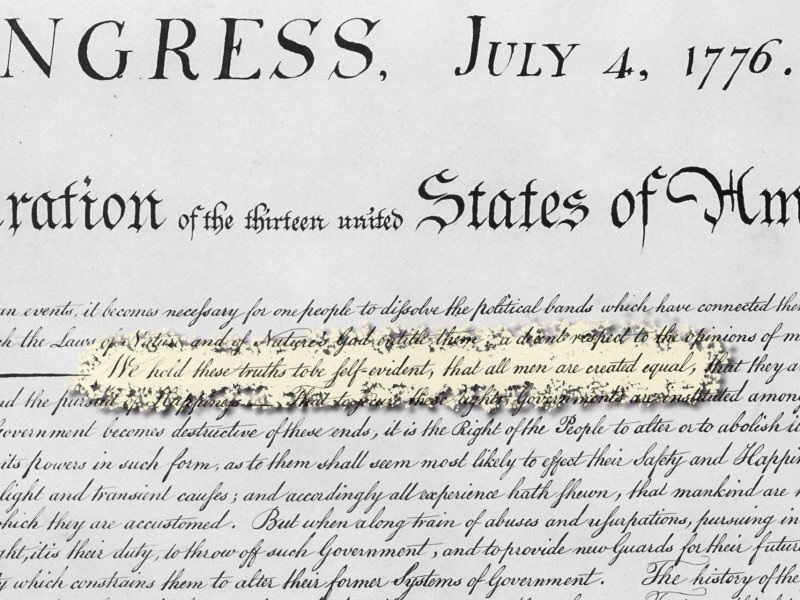
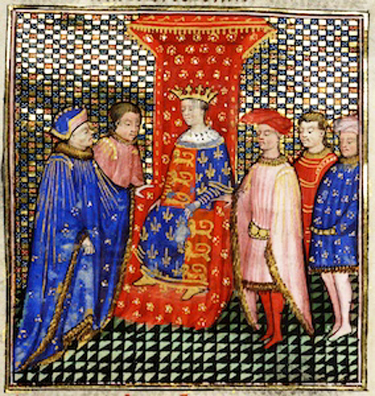 It seems strange that this is the quote used to refute hierarchy and kingship, since St. Gregory and St. Bellarmine clearly assert that the lesser gifted man should be ruled over by the greater. Indeed, Bellarmine wrote the treatise to counter the Anabaptist heresy that was promoting the idea that Christians should not exercise magisterial powers.
It seems strange that this is the quote used to refute hierarchy and kingship, since St. Gregory and St. Bellarmine clearly assert that the lesser gifted man should be ruled over by the greater. Indeed, Bellarmine wrote the treatise to counter the Anabaptist heresy that was promoting the idea that Christians should not exercise magisterial powers.
To equate the above quote with the phrase from the Declaration of Independence that “all men are created equal” is far-fetched, to say the least. And to think that Bellarmine was “ahead of his times” for repeating what St. Gregory stated 1,000 years earlier is absurd.
As the Church has always taught, all men are equal in essence, which is their human nature, and through Baptism, where men are adopted as the children of God. This equality, however, does not extend to the accidents of each man's life, which are necessarily different and create justifiable inequalities in many aspects of life. These inequalities require differentiated treatments.
The Church Doctor affirms inequality as a principle of the universal order established by God. If all men were truly equal in the sense that the revolutionaries use the word, Our Lady would not be the Queen of Heaven and Earth, nor would there be varying degrees of glory in Heaven.
Indeed, Bellarmine asserts in the same chapter that, even in the Paradise before original sin, there would have been many inequalities among men, who would have been ruled by a superior person:
“For even if servile subjection began after the sin of Adam, nevertheless there would have been political government even while man was in the state of innocence. And this is proved, firstly, because even then man would have been by nature a political and social animal, and hence would have had need of a ruler.
“Secondly, from Creation itself; because for that reason God made woman from man, and did not create many men at the same time, but only one, from whom all others were to be born; so that He might show the order and supremacy which He wished to exist among men, as St. Chrysostom observes.
"Thirdly, since in that state of innocence there would have been inequality of the sexes, of height, of strength, of wisdom and of virtue, therefore, both supremacy and subjection; for in human society there should be order. But right order demands that the inferior be ruled over by the superior, the woman by the man, the younger by the older, the less wise by the more wise, the less good by the better; moreover, the fact that these diversities would have existed even then may be shown in this way.” (2)
A government's powers derive from the consent of the governed
This should suffice to refute the first “self evident truth,” so let us go on to discuss the second “self evident truth”: “that, to secure these rights, governments are instituted among men, deriving their just powers from the consent of the governed.”
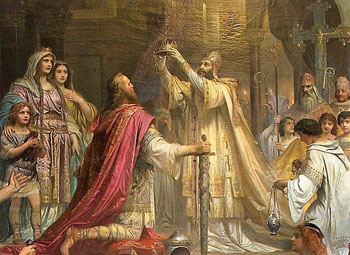 St. Robert Bellarmine yet again refutes this claim: “But in this place other matters should be noted. First, political power considered in general, not descending in particular to Monarchy, Aristocracy or Democracy, comes directly from God alone; for this follows of necessity from the nature of man, since that nature comes from Him Who made it.
St. Robert Bellarmine yet again refutes this claim: “But in this place other matters should be noted. First, political power considered in general, not descending in particular to Monarchy, Aristocracy or Democracy, comes directly from God alone; for this follows of necessity from the nature of man, since that nature comes from Him Who made it.
"Besides, this power derives from the Natural Law, since it does not depend upon the consent of men; for, willing or unwilling, they must be ruled over by someone, unless they wish the human race to perish, which is against a primary instinct of nature.
“But Natural Law is Divine Law; therefore, government was instituted by Divine Law, and this seems to be the correct meaning of St. Paul when he says: 'He that resisteth the power, resisteth the ordinance of God.' (3)
“Note, secondly, that this power resides, as in its subject, immediately in the whole State, for this power is by Divine Law, but Divine Law gives this power to no particular man; therefore Divine Law gives this power to the collected body. Furthermore, in the absence of positive law, there is no good reason why, in a multitude of equals, one rather than another should dominate...
“Note, in the third place, that, by the same Natural Law, this power is delegated by the multitude to one or several, for the State cannot of itself exercise this power therefore, it is held to delegate it to some individual, or to several, and this authority of rulers considered thus in general is both by Natural Law and by Divine Law. Nor could the entire human race assembled together decree the opposite, that is, that there should be neither rulers nor leaders.” (4)
Bellarmine makes it very clear that the power of a government does not come from the people, but from God. Although he affirms that the power rests in the whole State, he at the same time declares that, according to Natural and Divine Law, the power does not depend upon the consent of the people.
Further on, Bellarmine writes another statement that may seem to support the Declaration if read on its own. However, when placed in context with the first three points made above, one can easily see that Bellarmine’s reasoning was not revolutionary. He states:
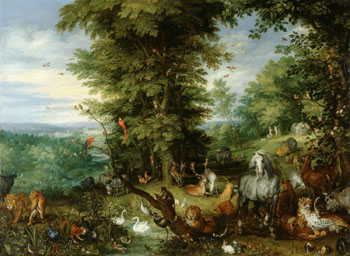 “Note, in the fourth place, that individual forms of government in specific instances derive from the law of nations, not from the Natural Law, for, as is evident, it depends on the consent of the people to decide whether kings, or consuls, or other magistrates are to be established in authority over them; and, if there be legitimate cause, the people can change a kingdom into an aristocracy, or an aristocracy into a democracy, and vice versa, as we read was done in Rome.” (5)
“Note, in the fourth place, that individual forms of government in specific instances derive from the law of nations, not from the Natural Law, for, as is evident, it depends on the consent of the people to decide whether kings, or consuls, or other magistrates are to be established in authority over them; and, if there be legitimate cause, the people can change a kingdom into an aristocracy, or an aristocracy into a democracy, and vice versa, as we read was done in Rome.” (5)
Thus, while Bellarmine asserts that people must consent to be governed, he does not prescribe this to the law of nature or to the Divine Law (both of which establish the authority of rulers, see third point in Chapter VI), but rather to the law of nations, the law that occurs due to the circumstances of various governments.
The partisans of the American form of government use the last part of Bellarmine’s fourth point to justify the third “self evident truth” – “that whenever any form of government becomes destructive of these ends, it is the right of the people to alter or to abolish it, and to institute new government, laying its foundation on such principles, and organizing its powers in such form, as to them shall seem most likely to effect their safety and happiness.”
Although Bellarmine admits that the people may change their form of government for a legitimate cause, he does not state that it is a right of the people to do so, only that it is acceptable according to the Law of Nations. The Declaration claims that a government can – and not only can but must – be overthrown if it “becomes destructive of these ends,” namely securing the rights of mankind to life, liberty and the pursuit of happiness.
According to St. Bellarmine, government is necessary based on Natural Law and its reason for existence is to create order and to labor for the common good. Securing the rights of mankind is never mentioned.
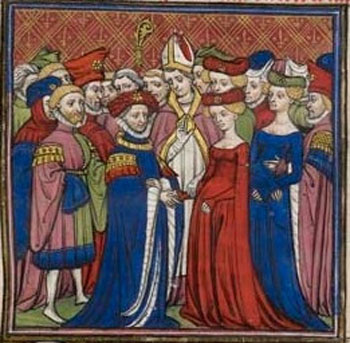 He writes: “Political rule is so natural and necessary to the human race that it cannot be withdrawn without destroying nature itself ... It is impossible for a multitude to hold together for any length of time unless there be one who governs it, and who is responsible for the common welfare ...
He writes: “Political rule is so natural and necessary to the human race that it cannot be withdrawn without destroying nature itself ... It is impossible for a multitude to hold together for any length of time unless there be one who governs it, and who is responsible for the common welfare ...
"Finally, society is order among many, for a disorderly and scattered multitude is not called society; moreover, what is order other than a certain succession of inferiors and superiors? Therefore, rulers have been necessarily ordained, if society is to endure.” (6)
Read in context, Bellarmine’s view of government is quite different from that of the Founding Fathers. Indeed, it must be, for the Catholic view of government is not revolutionary in any way. To take the great St. Bellarmine out of context in order to support a revolutionary secular and anti-clerical form of government is to do a great injustice to the Saint, who was a faithful son of the Church.
May the dawn soon come when the true ideals of government are again implanted throughout the whole world and these liberal philosophies are entirely abolished, allowing societies to flourish organically. Now is the time for all Catholics to return to the true teachings of St. Robert Bellarmine and leave behind the revolutionary doctrine of Thomas Jefferson.
Continued


Some Catholics pretend Jefferson was influenced
by St. Robert Bellarmine
According to these Catholics, the United States of America is the most Catholic form of government that has ever existed in the history of the world. If that be so, one can only wonder why the governments of Christendom (comprised mostly of monarchies and aristocracies) that were directly under the Church’s guidance are excluded from this boast.
'All men are created equal'
The first proof offered to demonstrate that Jefferson was inspired by Bellarmine is the phrase “all men are created equal.” Supposedly, Bellarmine was ahead of his time in making this statement. However, upon analyzing the actual texts of the Doctor of the Church, a completely different idea of equality than that proposed in the Declaration is found.
The quote of Bellarmine that resembles the phrase quoted above is clearly taken out of context, as follows:
“When he [St. Gregory] says, ‘All men are equal by nature, but are made unequal by sin, and therefore one should be ruled over by another,’ he does not mean that men by nature are equal in wisdom or in grace, but equal in essence and in human form, from which equality he rightly infers that one should not be dominated over by another, as man dominates over the beasts, but only that one should be ruled over politically by another.
“Hence, in the same place he adds: ‘For it is against nature to act proudly or to wish to be feared by one’s equals; for, truly, by sin sinners are made like to beasts; and they fall from that integrity of nature in which they were created.’ Therefore St. Gregory says in the same place that after the first sin one man rightly began to dominate over another with threats and punishments inspiring terror, which would not have been the case in the state of original justice.” (1)

This phrase is used to obliterate monarchies as unjust

To equate the above quote with the phrase from the Declaration of Independence that “all men are created equal” is far-fetched, to say the least. And to think that Bellarmine was “ahead of his times” for repeating what St. Gregory stated 1,000 years earlier is absurd.
As the Church has always taught, all men are equal in essence, which is their human nature, and through Baptism, where men are adopted as the children of God. This equality, however, does not extend to the accidents of each man's life, which are necessarily different and create justifiable inequalities in many aspects of life. These inequalities require differentiated treatments.
The Church Doctor affirms inequality as a principle of the universal order established by God. If all men were truly equal in the sense that the revolutionaries use the word, Our Lady would not be the Queen of Heaven and Earth, nor would there be varying degrees of glory in Heaven.
Indeed, Bellarmine asserts in the same chapter that, even in the Paradise before original sin, there would have been many inequalities among men, who would have been ruled by a superior person:
“For even if servile subjection began after the sin of Adam, nevertheless there would have been political government even while man was in the state of innocence. And this is proved, firstly, because even then man would have been by nature a political and social animal, and hence would have had need of a ruler.
“Secondly, from Creation itself; because for that reason God made woman from man, and did not create many men at the same time, but only one, from whom all others were to be born; so that He might show the order and supremacy which He wished to exist among men, as St. Chrysostom observes.
"Thirdly, since in that state of innocence there would have been inequality of the sexes, of height, of strength, of wisdom and of virtue, therefore, both supremacy and subjection; for in human society there should be order. But right order demands that the inferior be ruled over by the superior, the woman by the man, the younger by the older, the less wise by the more wise, the less good by the better; moreover, the fact that these diversities would have existed even then may be shown in this way.” (2)
A government's powers derive from the consent of the governed
This should suffice to refute the first “self evident truth,” so let us go on to discuss the second “self evident truth”: “that, to secure these rights, governments are instituted among men, deriving their just powers from the consent of the governed.”

The Church blesses the power of Kings to rule; above, Pope Leo III crows Charlemagne Emperor
"Besides, this power derives from the Natural Law, since it does not depend upon the consent of men; for, willing or unwilling, they must be ruled over by someone, unless they wish the human race to perish, which is against a primary instinct of nature.
“But Natural Law is Divine Law; therefore, government was instituted by Divine Law, and this seems to be the correct meaning of St. Paul when he says: 'He that resisteth the power, resisteth the ordinance of God.' (3)
“Note, secondly, that this power resides, as in its subject, immediately in the whole State, for this power is by Divine Law, but Divine Law gives this power to no particular man; therefore Divine Law gives this power to the collected body. Furthermore, in the absence of positive law, there is no good reason why, in a multitude of equals, one rather than another should dominate...
“Note, in the third place, that, by the same Natural Law, this power is delegated by the multitude to one or several, for the State cannot of itself exercise this power therefore, it is held to delegate it to some individual, or to several, and this authority of rulers considered thus in general is both by Natural Law and by Divine Law. Nor could the entire human race assembled together decree the opposite, that is, that there should be neither rulers nor leaders.” (4)
Bellarmine makes it very clear that the power of a government does not come from the people, but from God. Although he affirms that the power rests in the whole State, he at the same time declares that, according to Natural and Divine Law, the power does not depend upon the consent of the people.
Further on, Bellarmine writes another statement that may seem to support the Declaration if read on its own. However, when placed in context with the first three points made above, one can easily see that Bellarmine’s reasoning was not revolutionary. He states:

Bellarmine: Even in Paradise there would have been inequalities'
Thus, while Bellarmine asserts that people must consent to be governed, he does not prescribe this to the law of nature or to the Divine Law (both of which establish the authority of rulers, see third point in Chapter VI), but rather to the law of nations, the law that occurs due to the circumstances of various governments.
The partisans of the American form of government use the last part of Bellarmine’s fourth point to justify the third “self evident truth” – “that whenever any form of government becomes destructive of these ends, it is the right of the people to alter or to abolish it, and to institute new government, laying its foundation on such principles, and organizing its powers in such form, as to them shall seem most likely to effect their safety and happiness.”
Although Bellarmine admits that the people may change their form of government for a legitimate cause, he does not state that it is a right of the people to do so, only that it is acceptable according to the Law of Nations. The Declaration claims that a government can – and not only can but must – be overthrown if it “becomes destructive of these ends,” namely securing the rights of mankind to life, liberty and the pursuit of happiness.
According to St. Bellarmine, government is necessary based on Natural Law and its reason for existence is to create order and to labor for the common good. Securing the rights of mankind is never mentioned.

Bellarmine also defends the right of
the husband to rule the wife
"Finally, society is order among many, for a disorderly and scattered multitude is not called society; moreover, what is order other than a certain succession of inferiors and superiors? Therefore, rulers have been necessarily ordained, if society is to endure.” (6)
Read in context, Bellarmine’s view of government is quite different from that of the Founding Fathers. Indeed, it must be, for the Catholic view of government is not revolutionary in any way. To take the great St. Bellarmine out of context in order to support a revolutionary secular and anti-clerical form of government is to do a great injustice to the Saint, who was a faithful son of the Church.
May the dawn soon come when the true ideals of government are again implanted throughout the whole world and these liberal philosophies are entirely abolished, allowing societies to flourish organically. Now is the time for all Catholics to return to the true teachings of St. Robert Bellarmine and leave behind the revolutionary doctrine of Thomas Jefferson.
Continued
- The quote refers to one of St. Gregory the Great’s writings (another Saint wrongly exploited by the Americanists) and is found in.St. Robert Bellarmine's De Laicis – Chapter VII, see here.
- See here.
- De Laicis, Chap. VI. “The Same Inference is Drawn From The Efficient Cause,” see here
- See here
- De Laicis, Chap. V. “The Same is Deduced from the End of Political Power”, see here

Posted July 7, 2021
______________________
______________________





